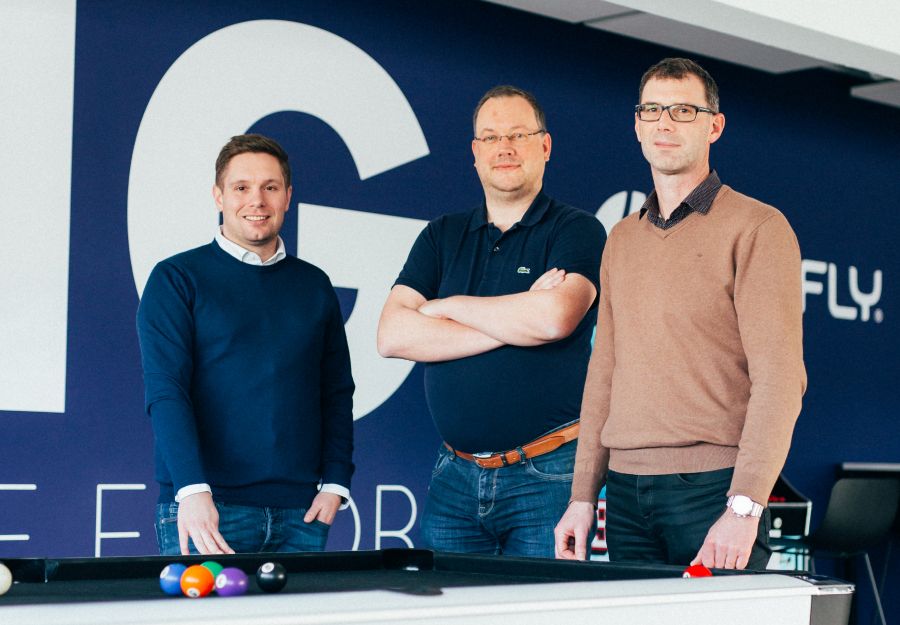The VITO spin-off, Unifly, is the world's most important developer and supplier of air traffic control systems specialising in drones. As a software developer, the company, which was created in 2015 and is based in Antwerp, constructs platforms that also enable flights made by drones to be controlled and monitored. Platforms of this type are essential as a means of ensuring that drone flights comply with the relevant air traffic regulations and that unmanned, remotely controlled aircraft can make use of our airspace safely and securely. They make it possible for our airspace to be controlled using a unified system – hence the name of the company itself.
2023 is set to become an important year for the drone industry. On 1 January, new European regulations will come into force that will give drones more freedom. More specifically, drones will be allowed to fly autonomously within line of sight. Not only does this include small craft, but large ones as well and the rules will apply to all flights made by drones, whether they are being conducted for recreational, commercial or government purposes. What is more, the new regulations will be the same throughout the European Union, and in other countries outside the EU, such as Norway and the United Kingdom. The intention behind the regulations is that they should boost the market for drones and pave the way for new activities that can be performed using drones. Drones represent a market that offers a great deal of potential and is estimated, on a global level, to be worth around 130 billion US dollars.
Whether they are being used to transport parcels, to monitor agricultural crops or to inspect overhead power lines, to name just a few of the many potential applications, enabling all of those drones to fly around safely and to avoid them getting in the way of other users of our airspace, means that new air traffic control systems will be needed. Systems that not only allow flights made by unmanned aircraft (such as drones) to be controlled and monitored, but flights by manned aircraft (such as planes, for example) as well.
Fortunately, the development of ‘unified’ air traffic control systems of that type is now fully underway. And that is mainly thanks to Unifly, the world's most important developer and supplier of systems of this type. Now based in Antwerp, the company was originally set up in 2015 within VITO, which fulfilled the role of an incubator. Seven years later, Unifly now employs a workforce of forty, operates production locations in two countries (in Belgium and the USA) and is involved in joint ventures with five national air traffic control services and with a few major players from the private sector as well. As we are now approaching 2023, a year that is intended to form the actual beginning of drones as a mode of airborne transportation and will therefore be a crucial year for Unifly, we spoke to the company's CEO, Andres Van Swalm, to find out how things are progressing.
The intention is that 2023 will become the ‘year zero’ of the drone. How is your company working towards that right now?
Van Swalm: ‘With great enthusiasm, but also with a certain feeling of suspense. The moment when the drone will genuinely be able to claim its place in our airspace is finally not far off. Drones have actually been around for years, but it isn't often you see one flying around. That in itself is indicative of the fact that right now, their rate of use is still rather limited. The next few years will see a change in that regard, however, and the market for drones is set to take off in an explosive way. Massive investments have been made and we will start to see the effects of those investments in the very near future.
In the past few months, during the run-up to the new pan-European legislation, we have updated our systems and platforms and, more specifically, the software that drives them. Our aim is to be fully ready and for our software to be fully compliant with what air traffic control services, drone operators and regulators are actually expecting of us.’
Those services, not only in Belgium but in Europe too, have already found their way to your door.
‘We are currently involved in joint ventures with seven air traffic control services, including the national air traffic control services of Belgium, Canada, Germany, Spain and Bulgaria. The port of Antwerp and the NEOM project, in which Saudi Arabia is busy constructing a new, state-of-the-art smart city, complete the Unifly's list of collaboration partners. After all, private-sector partners also have a need for air traffic control systems that incorporate drone flights alongside flights made by conventional aircraft.
The unified system your company offers brings flights made by unmanned and manned flights together within a single system. What is actually the most important difference between those two categories, with regard to control and monitoring?
‘One of the crucial differences lies in the way that the aircraft themselves are operated. While an airliner, a sports aircraft or a rescue helicopter is operated by an individual pilot or a limited team of pilots, a drone operator will be capable of operating large groups consisting of hundreds or even thousands of devices. That is why bringing these two categories of aircraft together within a single system is more complex than it may appear at first sight.
Nevertheless, providing an air traffic control system of that type will be essential, as without one, flying drones in large numbers and on a highly automated basis will be unsafe. And we must not forget the drone market actually offers a great deal of potential: aspects such as automation and flying large groups of drones will enable scalability and growth, which form the foundations of the business model of the drone industry itself. In that sense, we are therefore an enabling factor for that industry.’
Your company is a spin-off of VITO. How did you actually come to be set up there back in 2015?
‘One of our founders (editor's note: Unifly was set up by four people, Van Swalm being one of them) was working at VITO in remote sensing at the time. Not only does remote sensing make use of satellites, but it is also increasingly making use of drones these days as well. Remote sensing is not one of the activities our company is involved in, but the VITO's experience in both using and operating drones was extremely welcome. What is more, it was actually mutually beneficial relationship, as remote-sensing drones also need an air traffic control system.
While our company was in its start-up phase, VITO played the role of an incubator. That gave us the opportunity to create something completely new that involved the use of innovative technology – to develop an air traffic control system for drones, based on software that enables continuous data exchanges between drones and operating and control platforms. As far as we know, NASA was the only organisation developing systems of that type back in 2015.’
Sustainability is another aspect you have in common with VITO.
‘Drones are the only electric and therefore (potentially) low-CO2 aircraft we have at the moment. They can therefore play their part in reducing our carbon footprint, by using them to deliver packages, for example, but they can also be used to monitor our climate and the environment, as well as for environment-related activities such as agriculture and mobility. Whatever the applications they are used for, our systems will soon enable drones to make effective use of the airspace available to us. And that aligns very nicely with our mission – to facilitate the safety and efficiency of autonomous flight.’
What type of relationship does your company have with VITO today?
‘As spin-offs go, we are not a typical example, as VITO is still one of our shareholders, albeit no longer the only one. It is also thanks to VITO that we successfully completed our first capital rounds, which included investments from the Flemish investment company PMV and the Belgian venture capital fund Qbic. These were followed by additional cash injections by the German air traffic control company DFS, the Belgian Federal Holding and Investment Company (SFPI-FPIM), the Japanese drone management company Terra Drone and the Japanese investment fund JOIN.
The technology transfer experts at VITO also helped us apply for patents and expand our IP portfolio. Overall, it is due to all of these things that we are now fully ready for 2023. The technology is in place, the legislation is on its way and so in the not too distant future, the use of drones will truly be ready to take flight.’



